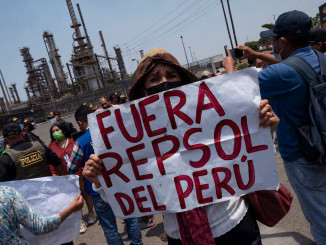
This article was written by Jules Boycoff and originally published at jacobinmag.com on February 4, 2022. It has been republished here with permission from the author.
On the cusp of the Beijing 2022 Winter Olympics, activists are ramping up their opposition to the games. Some are opposed primarily to the decision to host the games in China, while others are critical of the International Olympic Committee (IOC) wherever it sets foot. Taken together, the Beijing Olympics have stirred up more dissent than any Olympic Games in recent history.
International protesters are converging to raise serious concerns over human rights violations in China, from the suppression of Uighurs and other ethnic minorities in Xinjiang to the long-term repression of Tibetans to Beijing’s imposition of national security laws on Hong Kong that squelch political activism.
Some academics and human rights advocates are calling for an athlete boycott of the Olympics. Organizations like Human Rights Watch and Amnesty International are out in full force. Yaqiu Wang, a senior researcher at Human Rights Watch, told Jacobin, “There are so many human rights issues, and each should warrant the games not being awarded to Beijing in the first place.” An alliance of more than two hundred human rights organizations are demanding a diplomatic boycott of the Beijing games — along the lines of what the Joe Biden administration and a handful of allies have already declared, amid the growing attempts by both the Right and some liberals to stoke a new cold war with China.
Meanwhile, leftist activists who focus on the Olympics continue their long-term battle against the five-ring machine. But for them, China is a more complicated target. NOlympics LA, the anti-Olympics group that emerged out of the Democratic Socialists of America (DSA) chapter in Los Angeles, issued a statement last year warning against the tendency “to exceptionalize China’s crimes and propel a new Cold War without interrogating the exploitative milieu of global capitalism that inspired them, along with the Olympics.”
Natsuko Sasaki, a Paris-based organizer with the anti-Olympics group NON aux JO 2024 à Paris (NO to the Olympic Games in Paris), told Jacobin, “I am against every Olympic Games, including Beijing 2022.” Sasaki, who was born in Japan, also noted that netto-uyoku — far-right denizens of the internet in Japan — are fervently outspoken against staging the games in China. “When you know the opposition against the Beijing Games is dominated by the far right in your country of origin,” she said, “it’s complicated to raise your more nuanced voice.”
Still, even as the Left attempts to strike a more nuanced position than liberal opponents to the Beijing Games, its position is clear: no matter where it’s held, the Olympics is a racket.
Global Resistance
The International Olympic Committee and its corporate partners use the popularity and esteem of Olympic athletes to churn out huge profits — but athletes get little in return. Research by Ryerson University and the progressive athlete-led group Global Athlete found that Olympians receive a measly 4.1 percent of Olympics revenues and only 0.5 percent directly. Compare this figure to professional leagues like the National Basketball Association, the National Football League, the National Hockey League, Major League Baseball, and the English Premier League of football, where athletes receive between 45 and 60 percent of revenues.
Along with athlete-worker exploitation, critics of the Olympics have slammed the games’ egregious overspending, the militarization of the public sphere to protect the Olympic spectacle, the gentrification and forced displacement in host cities, Olympic greenwashing, and the democracy deficit that arrives with the games.
For decades, resisting the Olympic machine has been a game of activist whack-a-mole. The Olympic Games pop up in one city — generating dissent from existing activist groups fighting the forces of gentrification, hyperpolicing, and greenwashing — only to plunge beneath the surface, reemerging in the next city two years later. After the Olympics, protesters return to their main targets and objectives. As such, anti-Olympics activism has typically been not so much a “movement of movements” as a moment of movements. In other words, during the extended Olympic moment, extant activist groups have frequently come together using the Olympics as their fight-back focal point, only to disband when the games are over.
NOlympics LA, alongside similar organizations in Tokyo, Paris, Seoul, Rio de Janeiro, and elsewhere, are trying to change this by organizing a shift toward a transnational anti-Olympics activist movement. In July 2019, activists convened in Tokyo for the first-ever global anti-games summit. Activists are currently planning a second summit in Paris in May 2022. They connect online under the hashtag #NOlympicsAnywhere.
“The first transnational anti-Olympics summit in Tokyo in 2019 proved very important for the anti-Olympics movements to gain strength and influence,” said Satoko Itani, a professor of sport, gender, and sexuality studies at Kansai University in Japan. Itani, who took to the streets in protest during the Tokyo 2020 Olympics, described how
anti-Olympics activists from around the world shared their experience, knowledge, and strategies with activists on the front lines in Tokyo. . . . I witnessed Tokyo activists being energized through this international support and solidarity. The previous summit solidified the new transnational nature of the anti-Olympics movement, and I believe that this energy, knowledge, and confidence shared between activists succeeded in making a big dent in the Olympics myth.
Arielle Sallai, a NOlympics LA organizer and DSA-LA member, also stressed the importance of international solidarity. She told Jacobin:
It shows that this is so much larger than Los Angeles, that we’re part of a global movement involving past and future Olympic host cities, that this isn’t just a pet project of some DSA organizers but a really serious organizing project that spans the whole world.
Sallai added, “All serious socialists should be internationalists. Imperialism is a huge part of capitalism. NOlympics is one of the few DSA projects that speaks more to international work and connects us to people around the globe.”
Imperial Rumblings
Mainstream US political discourse does not specialize in complexity. In recent years, political elites have pushed strong anti-China sentiment. When Congress passed the recent $770 billion defense bill, it included $24 billion more than the Biden administration even requested. The punditocracy rationalized the increase by citing China as a growing geopolitical threat.
The push comes from not just Republicans, but Democrats, too. Simplistic narratives supported by both political parties contrast a liberty-loving United States with a perpetually scheming Chinese state. The bipartisan demonization campaign is getting results: last year, a Pew Research Center poll found that 67 percent of Americans held negative feelings toward China, a 21 percent uptick since 2018. The escalation of tensions between China and the United States could end in disaster. After all, the narrative arc of US demonology tends to land with a brutal, imperial thud.
Oversimple China-bashing ignores some notable facts: China has lifted around 800 million people out of poverty since 1980. According to the World Health Organization, China has only experienced around six thousand COVID-19 deaths; in January, the United States surpassed that total every three days. The United States has around 750 military bases dotting the globe while China has only one overseas. Also, as Alyssa Battistoni notes in New Left Review, “Chinese state investment in low-carbon technologies, and solar panels in particular, has catalyzed the renewable energy industry and set a challenge to Western governments.” University of California, Berkeley, sociologist Daniel Aldana Cohen has pointed out that “China continues to be the most important driver of global decarbonization.” US-China cooperation is crucial on climate change and other security matters.
None of this excuses the extreme human rights abuses carried out by China where, in addition to the repression of Uighurs, Tibetans, and Hong Kong democracy activists, LGBT advocates and feminists are experiencing a fresh wave of suppression. In the context of a bipartisan ramp-up of bellicosity, the Beijing Olympics risks becoming yet another arrow in the justificatory quiver of war.
Some leftist activists are concerned that criticizing Beijing 2022 in light of human rights violations risks opening a Pandora’s box of anti-Asian hate while green-lighting imperial warmongering. The anti-Olympics left has proceeded with caution, mirroring arguments emerging from the wider left that one can both criticize the Chinese government for squelching free speech and slam both Olympic honchos for their epic greed and the United States for its xenophobic imperialism.
Athletes’ Dilemma
We are living in the athlete empowerment era, with more and more socially conscious athletes making political statements in the public sphere. For them, Beijing presents a particular quandary.
Groups like Global Athlete are advising Olympians not to speak out on political matters in Beijing, especially if it risks running afoul of Chinese law. Turns out, breaching Chinese law is pretty easy to do. An analysis by the group China Law and Policy noted that the mere mention of Tibet or Xinjiang could be construed as inciting separatism under Chinese criminal law, while taking a stand on any controversial cause could breach a law that prohibits “making disturbances in public places.” At a recent press conference, a member of the Beijing 2022 organizing committee stated that athletes would face “certain punishments” were they to speak out.
Complicating matters, the International Olympic Committee has consistently sided with Chinese authorities, thereby sending a clear message to athletes that it would be unwise to speak out at the Beijing Games. When Chinese tennis star Peng Shuai, a three-time Olympian, accused former vice premier Zhang Gaoli of sexual assault, the IOC essentially ran political interference for China, setting up a thirty-minute video call with Peng, after which the IOC president blithely concluded that she was doing just fine. The IOC’s willful gullibility was breathtaking, and it sent an unequivocal message to Beijing-bound athletes that if they were to take a spiky political stand, the IOC would not have their backs.
Noah Hoffman, a two-time Olympian in cross-country skiing, told Jacobin:
Far from defending athletes who speak out off the field of play and the podium, the IOC’s actions in the Peng Shuai case have shown that they will aid and abet those who silence athletes rather than defending athletes. The IOC worked with the CPC (Communist Party of China) to cover up the Peng Shuai story and to pretend like she never made allegations of sexual assault. There is no reason to think they will act differently if athletes speak out in Beijing. Athletes should not expect the IOC to protect their right to express themselves in Beijing. The IOC may even assist those who are doling out the punishment. This is an unbelievable dereliction of the IOC’s duty to protect athletes. I am furious.
Many Olympians have voiced their displeasure with the situation. US Olympic skiing star Mikaela Shiffrin told Reuters:
You certainly don’t want to be put in the position of having to choose between human rights, like morality versus being able to do your job, which on the other hand can bring light to some issues or can actually bring hope to the world at a very difficult time.
She added, “What’s a real bummer is that there’s not only accusations but, like, legitimate proof in a lot of these places we’ve been going the last several Olympics.”
Shiffrin is not alone. US Olympic ice dancer Evan Bates stated, “I can say human rights violations are abysmal. . . . We’re human beings too and when we read and hear about the things that are happening [in China] . . . we hate that.” US Olympic snowboarder Jamie Anderson said she wished the Olympics were not being staged in China.
Some accuse China of sullying the Olympics. In reality, the Olympic Games have long been dirty business.
Beijing presents a complicated moment for leftist activists, one that must be approached with care. But we are witnessing an incredibly propitious moment for anti-Olympics activism, with the Beijing 2022 Games shining a spotlight on the International Olympic Committee’s brazen hypocrisy while, at the same time, transnational activism is gaining momentum against the games through deep organizing, the likes of which we have never seen before. The longstanding anti-Olympics movement can benefit from the additional global attention on the Beijing Games — and channel it into something much more productive than saber-rattling against China.




